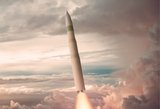Russia deploys two bombers to Venezuela for exercises
Two Russian long-range strategic bombers landed in Venezuela on 10 December for what the government said were air force exercises aimed at strengthening the defence of the South American country.
Gen Vladimir Padrino, the Venezuelan defence minister, welcomed about 100 Russian pilots and other personnel after the two TU-160s and two other aircraft landed at the international airport that serves Caracas.
Padrino said the deployment showed ‘we also are preparing to defend Venezuela to the last inch when necessary.’
‘This we are going to do with our friends, because we have friends in the world who defend respectful balanced, relations,’ he said.
The commander of the Russian Air Force's long-range aircraft, Gen Sergei Ivanovich Kobulash, said the exercises would provide ‘a profound exchange of experience between pilots and technical staff’ from both countries.
The development follows hot on the heels of a visit to Moscow last week by President Nicolas Maduro during which he had talks with Russian President Vladimir Putin, who expressed support for his beleaguered socialist government.
Besides the two bombers, the deployment included an An-124 transport plane and an Il-62 passenger plane, according to a Russian military announcement in Moscow.
Padrino noted that Russian aircraft had visited before in 2013, but said their current deployment was part of a ‘new experience.’
He said exercises would be held to ‘raise the level of interoperability of the aerospace defence systems’ of both countries.
It was unclear how long the Russian deployment would last, and Padrino did not provide details about the exercises planned.
Venezuela acquired 24 Sukhoi-30 Russian fighters and signed a deal to purchase 53 MI-24 helicopter gunships and 100,000 Kalashnikov rifles in 2016.
Former defence minister Raul Salazar said the exercises with Russia ‘are part of what is called psychological warfare.’
‘The purpose is to increase the perception that Venezuela is supported by Russia, China and Belarus, that it has the support of a power, in case another power tries to invade,’ Salazar told AFP.
Padrino added however that other countries in the region had created ‘political and military imbalances’ against which the Venezuelan government could not stand idly by - an apparent reference to Bogota, which Caracas has accused of harbouring US military bases.
More from Defence Notes
-
![US Air Force pushes Sentinel’s initial capability to early 2030s despite China’s nuclear progress]()
US Air Force pushes Sentinel’s initial capability to early 2030s despite China’s nuclear progress
While the US struggles to modernise the 50-year-old land leg of its nuclear triad, China has been rapidly developing and fielding new nuclear capabilities.
-
![Why small guns have been critical to layered CUAS architectures]()
Why small guns have been critical to layered CUAS architectures
Multiple countries have been deploying small arms as the last line of drone defence due to their multiple operational and tactical advantages.
-
![Singapore Airshow 2026: ST Engineering hints at export success for AME assault rifle family]()
Singapore Airshow 2026: ST Engineering hints at export success for AME assault rifle family
The Singapore-based technology company unveiled its new rifle family at this week’s airshow. Chen Chuanren spoke with the ST Engineering’s head of small arms to find out more about how the weapons have been refined.
-
![High tension in the High North – a wake-up call for NATO’s future Arctic defence efforts?]()
High tension in the High North – a wake-up call for NATO’s future Arctic defence efforts?
Any potential ‘Arctic Sentry’ mission would be months in the planning, but with tensions high in the region given the US’s push for Greenland, NATO countries will need to continue to emphasise their commitment to the region, analysts have said.
-
![Venezuela prepares personnel and equipment for a potential second US attack]()
Venezuela prepares personnel and equipment for a potential second US attack
Defence Minister Gen Vladimir Padrino López has declared that the Venezuelan armed forces “will continue to employ all its available capabilities for military defence”.























